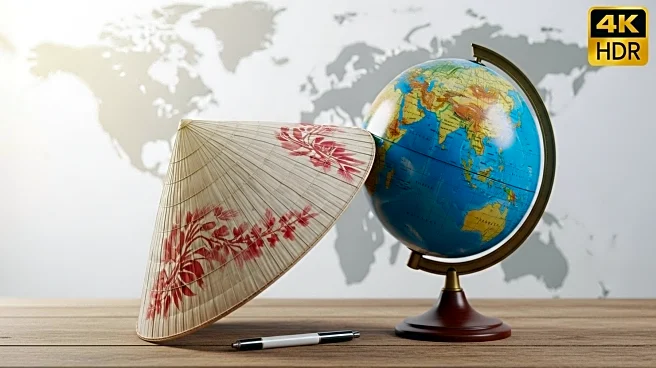What is the story about?
What's Happening?
Vietnam's Prime Minister Pham Minh Chinh announced that the country is actively seeking new trade agreements to mitigate the impact of tariffs imposed by the United States. These tariffs, which were introduced by the Trump administration, have significantly affected Vietnam's exports, with estimates suggesting a potential reduction of up to 20% in exports to the U.S. Vietnam aims to sign free trade agreements with Latin America's Mercosur trading bloc and Gulf Cooperation Council countries by the end of the year. Despite these challenges, Vietnam's exports have grown by 15.8% from the previous year, reaching $325.3 billion as of September 15. The prime minister emphasized the importance of continuing trade negotiations with the U.S. and addressing concerns related to imported goods that may violate international copyright or have questionable origins.
Why It's Important?
The tariffs imposed by the United States have placed Vietnam in a challenging position, as the U.S. is its largest export market. The potential reduction in exports could have significant economic implications for Vietnam, affecting its growth and trade balance. By pursuing new trade agreements, Vietnam aims to diversify its export markets and reduce dependency on the U.S., thereby stabilizing its economy. The move also highlights the broader impact of U.S. trade policies on global trade dynamics, particularly in Southeast Asia. Countries like Vietnam are compelled to adapt and seek alternative partnerships to sustain their economic growth amidst strategic competition and conflicts.
What's Next?
Vietnam plans to finalize free trade agreements with Mercosur and Gulf Cooperation Council countries by the end of the year, which could open new markets for Vietnamese goods and offset the impact of U.S. tariffs. Additionally, Vietnam will continue its trade negotiations with the United States, aiming to resolve issues related to tariffs and trade practices. The government is also focusing on cracking down on imported goods that may violate international copyright or have issues with their origin, addressing concerns raised by U.S. officials. These steps are crucial for Vietnam to maintain its export growth and strengthen its position in global trade.
Beyond the Headlines
The situation underscores the complexities of international trade relations, where strategic competition and tariff policies can significantly impact economies. Vietnam's proactive approach in seeking new trade agreements reflects a broader trend among countries to diversify their trade partnerships and reduce reliance on single markets. This development also highlights the importance of addressing intellectual property rights and origin issues in international trade, which are critical for maintaining fair trade practices and fostering trust between trading partners.















